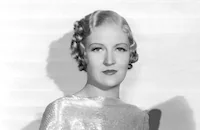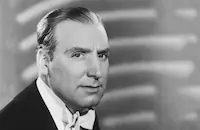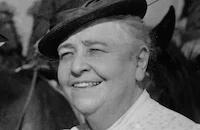Roman Scandals
Cast & Crew
Frank Tuttle
Eddie Cantor
Gloria Stuart
Edward Arnold
David Manners
Ruth Etting
Film Details
Technical Specs

Synopsis
Warren F. Cooper, the leading citizen of West Rome, is outraged to find Eddie, a beloved local "little guy," sleeping on the statue of the Empress Agrippa in the Museum of Roman Art, which Cooper donated to the town. Later that morning, Cooper, the mayor, and Charles Pratt, the chief of police, discuss Cooper's latest scam: Cooper will donate the land for a new city jail, and the three will split the contractor's fees, as they have done for Cooper's previous donations. Pratt drops the check Cooper gives him, however, and it is found by Eddie. Eddie then commiserates with the unfortunate people who will be made homeless by Cooper taking over their land, and when he stands up to Cooper, the police throw him out of the city. As he walks along the road, Eddie is hit by a wagon and dreams that he is in ancient Rome. There he insults two soldiers, and Josephus, a great friend of the people, takes him to the slave market. Josephus, who calls Eddie "Oedipus," takes pity on him and buys him, but Eddie is soon imprisoned when he tries to aid the Princess Sylvia, who has been captured by the corrupt Emperor Valerius and is being paraded behind his chariot. Sylvia is cast into the dungeon with Eddie, and there Valerius threatens to kill her people if she does not become his favorite. She reluctantly agrees to accompany him to the palace, and Valerius takes Eddie also when Eddie makes him laugh. At the palace, Valerius is reunited with his scheming wife Agrippa, who is continually trying to poison him. Eddie is made Valerius' new food taster when the old one succumbs to another of Agrippa's plots, while Josephus and Sylvia, who are in love, meet secretly to plan her escape. Agrippa attempts to force Eddie to poison Valerius, and Valerius orders Josephus to leave Rome forever the next day. Josephus and Eddie plot to spirit Sylvia away that night, after which Eddie, disguised as an Ethiopian beauty specialist, sneaks into the women's baths to inform Sylvia. Later, Valerius tells his counselors that they will again raise the taxes to build a new palace, then pocket the money left over. The counselors mistrust Valerius and make him put his promises in writing, but Eddie finds the scroll when they drop it. He then goes to the kitchen, where Agrippa shows him the poisoned nightingale for Valerius, which has been marked with a sprig of parsley. Eddie becomes confused after serving the food, however, for the safe dish he was supposed to taste has also been garnished with parsley. The plot is then revealed when Valerius discovers the poison. Eddie, Josephus and Sylvia are blamed, but Olga, Valerius' former favorite, helps Sylvia join Josephus. Eddie discovers that Valerius intends to have Josephus murdered, and he rushes after him with the news. After a chariot chase, Eddie informs Josephus of the scheme and gives him the scroll. They are pursued by Valerius' majordomo, and Eddie bravely distracts him so that the couple can escape. As Eddie's chariot goes over a cliff, Eddie wakes from his dream and finds in his pocket the check with which Cooper paid off Pratt. Eddie races back with the evidence, and the corrupt men are soon behind bars, after which Eddie sings as his friends move back into their homes.

Director
Frank Tuttle
Cast

Eddie Cantor

Gloria Stuart

Edward Arnold

David Manners

Ruth Etting

Verree Teasdale

Alan Mowbray
John Rutherford
Willard Robertson
Lee Kohlmar
Paul Porcasi
Stanley Fields
Dewey Robinson
Clarence Wilson
Grace Poggi
Harry Holman
Charles C. Wilson

Jane Darwell
Billy Barty
Katharine Mauk
Rosalie Fromson
Mary Lange
Vivian Keefer

Barbara Pepper
Theo Phane

Lucille Ball
Florence Wilson
Genevieve Irwin
Dolly Bell
Rose Kirsner
Crew
Busby Berkeley
John W. Boyle
Ralph Cedar
Ralph Colgrove
Richard Day
Al Dubin
Elsie-louise
L. Wolfe Gilbert
Samuel Goldwyn
John W. Harkrider
Stuart Heisler
Ray June
George S. Kaufman
Malcolm Macpherson
William Anthony Mcguire
Alfred Newman
George Oppenheimer
Nat Perrin
Arthur Sheekman
Robert E. Sherwood
William Thompson
Sherman Todd
Gregg Toland
Vinton Vernon
Harry Warren

Film Details
Technical Specs

Quotes
Trivia
The chorusgirls, among them Lucille Ball, chained to the wall in the "No More Love" number are actually nude. The number was filmed during the night, when no studio bosses were around on the lot, with a minimum of technicians involved.
Notes
According to Hollywood Reporter news items, Myra Bratton, Berton Churchill, Lane Chandler, and Michael Visaroff were to be in the cast of this film, but their participation in the completed picture has not been confirmed. Hollywood Reporter also noted that cameramen Malcolm MacPherson, William Thompson and Ralph Colgrove were injured while shooting the chariot chase scenes. The picture's premiere at Grauman's Chinese Theatre was broadcast live on the radio, and Eddie Cantor appeared at the New York opening to sell tickets and perform on stage before the show. According to a September 30, 1933 Motion Picture Herald article, producer Samuel Goldwyn intended to roadshow the film in the South on a specially equipped train, as he had done with Whoopee (1930) and The Kid from Spain. According to a Film Daily news item, Goldwyn made special arrangements with independent New York exhibitors to accept less than his usual fifty percent of the box office receipts for the exhibition of Roman Scandals.
According to modern sources, Goldwyn desired to purchase the rights to George Bernard Shaw's Androcles and the Lion as a vehicle for Cantor, but when Shaw refused to adapt the play for the screen, Goldywn hired George S. Kaufman and Robert Sherwood to write an original script with a Roman theme. According to a 1972 New York Times article on Kaufman, the writer, tired of dealing with film actors, stipulated in his contract that he would not have to meet Cantor or listen to his views on the story. When Cantor appeared at a story conference and expressed his ideas at great length, Kaufman left the room and refused to do any further work on the script. Kaufman and Sherwood had provided a treatment, however, and Goldwyn hired the other writers credited above to finish the screenplay. When Kaufman and Sherwood demanded the rest of their salaries, Goldwyn refused to pay on the basis that they had not provided a finished product, and the two writers filed suit against him in January 1934. The case was settled out of court in late August 1936, and a August 26, 1936 Hollywood Reporter news item reported that Kaufman and Sherwood had accepted $20,000 and agreed to waive all other claims. Another suit against Goldwyn, Cantor and United Artists was filed on April 16, 1935 by Mort Eisman, Clara Dellar and Robert Louis Shayon, who claimed that Roman Scandals was plagiarized from Eisman's 1929 play Oh, Shah (production undetermined). The case was dismissed in various courts a number of times throughout the 1930s, but the final outcome has not been confirmed. An May 8, 1936 Hollywood Reporter news item related that when filing a general denial of plagiarism in the case, Cantor pointed out that he was not under contract to United Artists, but was instead in partnership with Goldwyn. Modern sources also note that Goldwyn's profits on Roman Scandals were over a million dollars, and that he brought Jack Warner before the AMPP in protest over Warner Bros.' "pirating" of the services of dance director Busby Berkeley. Berkeley was also filming Footlight Parade while this picture was being shot, and it was the last of four films Berkeley did for Goldwyn. According to modern sources, it was as Goldwyn was resigning from the AMPP in protest over Warners Bros.' actions, that he uttered his often quoted phrase "Gentlemen, include me out!"
Although some modern sources claim that Goldwyn girl Lucille Ball made her screen debut in this film, she had already appeared in two earlier 1933 films, Broadway Thru a Keyhole and Blood Money. Roman Scandals did, however, mark the screen debut of Barbara Pepper. Although contemporary sources assert that this picture marked the feature film debut of Broadway musical star Ruth Etting, she had appeared as herself in Mr. Broadway, which was produced and released prior to this film. Roman Scandals did, however, mark her first starring role in a feature film. In a modern interview, Berkeley stated that Paulette Goddard was one of the Goldwyn girls, and that the Goldwyn girls in the slave market scenes were completely nude under their long blonde wigs. Modern sources include the following actors in the cast: Iris Shunn, Jane Hamilton, Gigi Parrish, Bonnie Bannon and Dolores Casey (Goldwyn girls), Charles Arnt, Stanley Andrews, Stanley Blystone, Harry Cording, William Wagner, Louise Carver, Francis Ford, Leo Willis, Duke York, Frank Hagney, Michael Mark, Dick Alexander, John Ince and Aileen Riggin.












